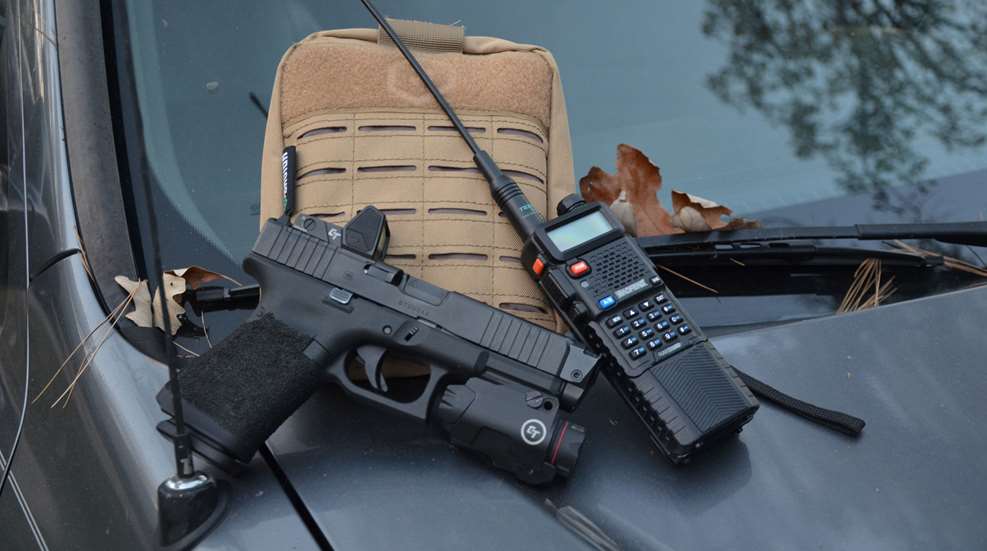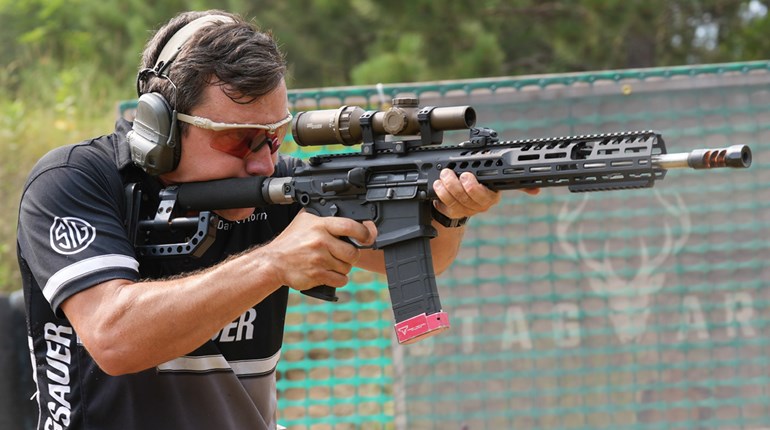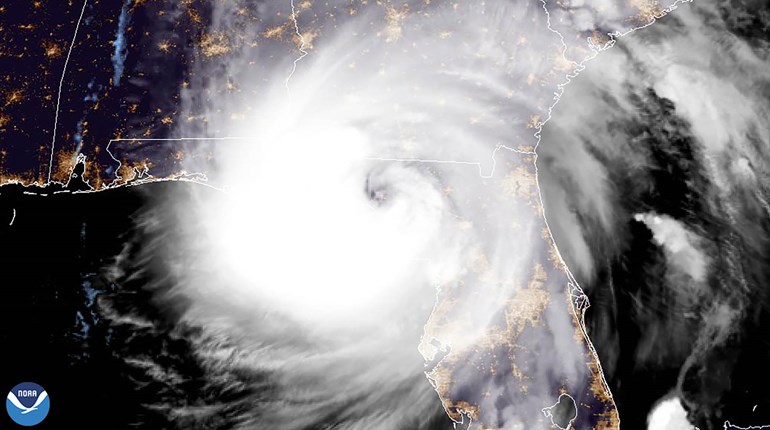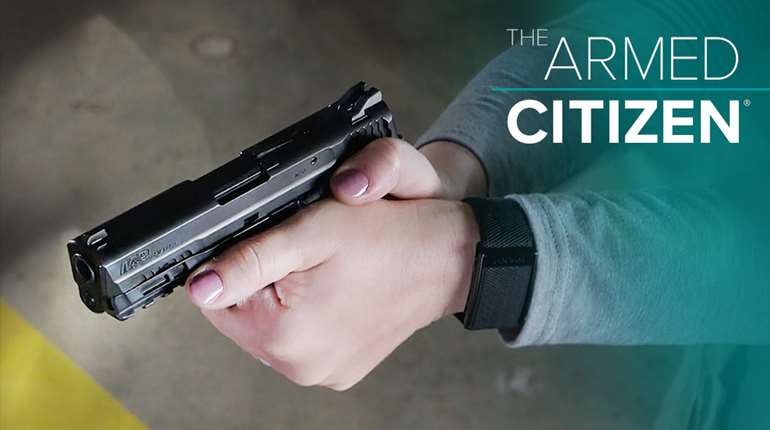
No matter how we live, the job we do, or community we are a part of, preparedness is an activity we practice every day. Whether it’s buying groceries or putting gas in our cars—preparedness is a way of life. Here are some simple steps to engrain preparedness as a habit, which can help you be better positioned to deal with emergencies..

1. Food and Water + Energy
Humans eat every single day, and we need water. These are just facts of life. But do you have a water supply if your water was shut off? Do you have a means of collection, filtering or purifying water? Do you have enough food to stay in your house for a week or two?
Every home should have at least a two-week supply of food and water. Think shelf-stable, things that don’t require electricity to heat or cook. Canned soup and a few candles for heating it could actually push you through a few days of hurricane power outages. Get a simple foil pan and sterno fuel can set up for catering and keeping food warm. Warm soup, saltines a drink of water and a good book would actually be a fairly low key way to ride out a storm and power outage.
Having foods that do not require heatprotein bars, pre-mixed shakes and other forms of protein and nutrient-dense foods are other staples to have on hand:
- Jerky, canned tuna, salami or dry sausages that don’t require refrigeration
- Crackers and other shelf-stable carbohydrates to give you energy
- A few packs of protein or breakfast bars
- Powdered milk, eggs, butter, and camping meals you can heat with a good camp stove are also worth investing in.
- Beans and rice if you have a way to safely cook over a fire or on your grill
Water is going to be needed not for just drinking, but also cooking and washing. You must consider sanitation and how you would flush a toilet if there was no water. A pitcher and your bathtub full of water would allow you to refill your toilet tank and use it, even if your water was shut off. Purchasing a bathtub bladder can ensure your water stays clean, too.
Drinking water should be either bottled water, or big containers of water for a home dispenser, but you can also make your own filter or purchase one. The Berky filter is one of the best filter systems you can buy, but you can make one as well.
Each person in your family should have some sort of portable water filtration, like a filter bottle or straw, in case they have to leave home.

2. Personal Safety: Guns, Ammo, Medical Supplies
In emergencies, staying at home, sheltered and out of harm’s way, is probably the best thing you can do. Staying home also affords you a network of support—neighbors, friends and family know where you are.
Stay low key and don’t attract attention if you are experiencing civil unrest. And if you must leave, having a personal-defense firearm, ammo, and medical supplies is a smart plan.
Make sure your personal-defense firearms fit your skill level and situation. It’s not a bad idea to have both a rifle and a pistol—something small you can conceal and something formidable you can wield to keep potential trouble from looking at you as a “soft” target. Training for these situations is also a worthwhile investment. You should have:
- Rifle in a common caliber like .223, and several loaded magazines
- Pistol in a common caliber like 9 mm, and several loaded magazines
- Several hundred rounds of ammunition for each firearm
- A bag to carry each in that’s inconspicuous and doesn’t look tactical
Medical supplies are also good items to stock. Simple things like bandages and steri-strips in case you get cut pulling tree limbs off your driveway after a storm, or cut yourself opening a can of soup.
Bigger picture items like a tourniquet and a good first aid kit are items that could save a life. Along with that, the skills from a basic CPR and first aid course are worthwhile additions. Stock up on any medicines that your family takes, as well as antibiotic ointment and the supplies to care for common things you might not be able to get to a doctor for: super glue for cuts; antibiotics in case of a deep cut; eyewash and eyedrops; and items like epi-pens, allergy meds or inhalers if you need those.
3. Gas and Electric
Filling your car with gas if there is an impending hurricane and threat of evacuation is always smart. During power outages from storms, gas pumps might not work. Have enough gas, stored safely, to get to your bug-out location. If you must evacuate a coastal town to stay with family or friends, it is wise to have a couple of filled gas cans to get you there.
Lack of electricity is also an issue for your refrigerated and frozen food, as you could lose it all. You won’t be able to take your refrigerator to a repair shop during a power outage, so don’t open your fridge or freezer unless it’s necessary, or until the power comes back on. If you have a generator intended for use in such emergencies, have it ready as well as enough fuel. It’s also wise to test your generator by starting it a few times a year.
An event that causes an electromagnetic pulse (EMP) could also take out power, and that’s a much more problematic scenario. Unless your electronics and car were stored in a Faraday cage/bag, you might not be able to use them. This is a true risk in a modern society accustomed to having power back in a few hours, or sitting in a car to keep warm or charge a cell phone. If an EMP happened, depending on your electronics, not much is going to work, and possibly for a while. Your cell phone unplugged and turned off might survive, but if the network it runs off loses power or has had its hardware destroyed, it might not be useful for long. Reading about how EMPs would stop cars and electronics is interesting and honestly, more realistic as a potential threat to safety and infrastructure.
Lack of electricity also means your heat might not work. Make sure you have some extra clothing and means of keeping warm. If it’s winter, understand how to shut your water off so your pipes don’t freeze. Becoming as self-sufficient as possible is probably the biggest piece of mindset we can change by learning everything we can.

4. Communication: Batteries, Phones, Radios
The reality of living without electricity or a means to communicate leads a thinking person to plan for a way to communicate, should power go down for long.
A good radio, like the BaoFang, stored in a place it will not be destroyed by an EMP and batteries to run it are smart tools to have. Solar battery chargers and other items to keep a radio running are also smart preparedness items.
5. Go Bag and a Plan
If you live in a very populated area, emergency situations present you with decisions. Even a small lapse of power and water can turn ugly fast. Looting and rioting are real concerns.
Deciding to leave your home might be a wise course of action. Deciding to do so early enough for it to be safe is the real key to evacuating. Hurricane evacuation routes can turn into parking lots, and fighting over gas and water can be dangerous situations. Even if you are prepared and have your gas, water and go bag of gear, driving through a gathering of people who are less prepared can hold risk.
Consider leaving at a time of day where you will be less likely to be noticed.
If you are leaving with more than one vehicle, travel together, with radios and with a planned route and backup route.
Arrange an alternate meeting point if you get separated and decide on a timeline for waiting versus continuing to your destination.
What goes in your go-bag? Here are some things you can keep at the ready and others in a bin or bag, ready to load into your car:
- Guns, ammo, plate carrier, helmet
- Sunglasses / eye and ear pro
- Radio and batteries
- Food and water
- Meds, first aid kit and tourniquet
- Maps, evacuation plan and gas to get there
- Tire repair kit and tools
- Water filter—small, portable
- Emergency blanket and warm clothing if needed, or rain gear
- Tarp to cover it all in your vehicle and stay low key
- Boots or shoes in your car at all times, in case you need to leave from your job.
In the end, how prepared we are for emergencies depends on our own efforts to work toward continual improvement and managing logistics. Logistics are something even small children understand, and it can be an activity the entire family takes part in to ensure you can safely ride out emergencies.














































